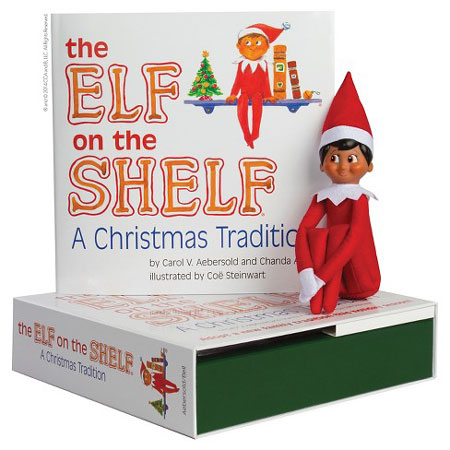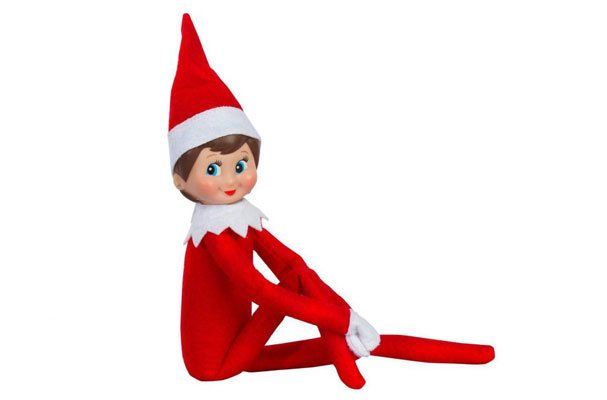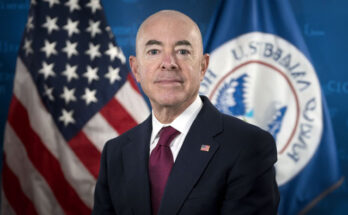Column By Melissa Martin

I don’t like the mischievous elf on or off the shelf. There, I said it. Some parents may wag their tongues and refer to me as Grinch, Scrooge, or holiday party-pooper. Wag away.
The Elf on the Shelf: A Christmas Tradition, a children’s book, written by Carol Aebersold and her daughter Chanda Bell, was self-published in 2005. Eventually, it became a Christmas craze that turned into big business. Giving the benefit of the doubt to the elf’s creators, their purpose wasn’t to encourage world-wide parental deceit. They didn’t originate a spying Santa or the popular stakeout song. “He sees you when you’re sleeping. He knows when you’re awake. He knows when you’ve been bad or good.” Were Aebersold and Bell manipulated by greedy manufacturers?
Here’s why the Elf on the Shelf should be shoved back into the box. Several younger children have confided in me about their fear of the elf. They refuse to be alone in rooms where the elf is lurking. They fear the elf will tell Santa when they misbehave. They believe the elf is observing them at home, at school, on the bus, and everywhere. Hmm, that sounds like paranoia.
Kids know if you are on the naughty list, you don’t get gifts from Santa. So, Santa and the sneaky elf are in cahoots. What’s next? An elf surveillance chip in the forehead to monitor kids in the bathroom? “Elf on the Toilet Shelf.”
Children believe what parents tell them. And when they develop doubts and question parents, they become even more confused when parents keep up the make-believe story (i.e., sham, charade, lie). Yes, I know most parents mean well, however…
Parents that threaten kids with the elf to control disruptive or dishonest behaviors need their own “Supervisor Elf on the Workplace Shelf” or “Boss Elf on the Desk” or “Spy Elf in the Break Room.” What about “Elf in the Car” to report adults for speeding or road rage? Or what about “Elf on the Bedroom Shelf” to keep spouses/partners from dirty fighting.
Read the following description: “The Elf on the Shelf® is a fun-filled Christmas tradition that has captured the hearts of children everywhere who welcome home one of Santa’s Scout Elves each holiday season. The magical Scout Elves help Santa manage his nice list by taking note of a family’s Christmas adventures and reporting back to Santa at the North Pole nightly. Each morning, the Scout Elf returns to its family and perches in a new spot, waiting for someone to spot them. Children love to wake up and race around the house looking for their Scout Elf.” www.elfontheshelf.com.

I think Elf on the Shelf is a tattletale. Merriam-Webster’s definition of tattletale: someone (such as a child) who tells secrets about what someone else has done: informer. “I watch and report on all that you do!” the elf warns in The Elf on the Shelf book. Should he be renamed “Big Brother Elf on every Shelf?”
Parents, do not shift your discipline responsibilities to a toy elf. When the gig is up, how are you going to teach teens to respect and obey house rules or how to manage and self-regulate emotions, instant gratification, and impulse control? The elf is a negative parenting tool. Children need to learn about consequences and how to make better decisions and wise choices.
In a 2012 article in Psychology Today, David Kyle Johnson Ph.D. writes “I have argued against the Santa Claus lie – the practice of tricking your children into believing that Santa Claus is literally real – elsewhere (in 2009, 2010 and in my book The Myths that Stole Christmas). My argument is threefold. It’s a lie (that does not encourage imagination), it threatens your parental trustworthiness, and it encourages credulity. But The Elf on the Shelf is basically a steroid shot for the Santa lie—a physical reminder of the Santa lie in your house for a whole month. So, it should not be surprising that my objections to the practices surrounding The Elf on the Shelf are similar.”
Parent Redemption
Come clean. Tell your kids the tattling elf is not alive. He/she is just a toy and has no magical powers.
However, families can pretend with the elf by creating funny scenarios, but no more spying and flying lies. Invite the kids to make-up comical scenes with toy elf.
Or throw the elf away after explaining that mom and dad were behind the pranks. Parents aren’t perfect — you can learn from this. This modern-day holiday-hyped tradition needs a permanent timeout.
Elf on the Shelf is certainty a Christmas controversy. What say you?
Melissa Martin, Ph.D., is an author, columnist, educator, and therapist. She lives in Ohio. Contact her at melissamcolumnist@gmail.com.









